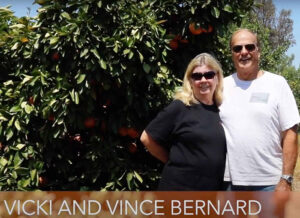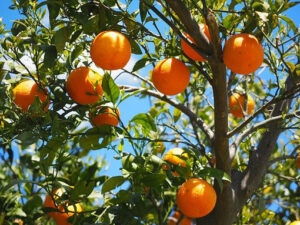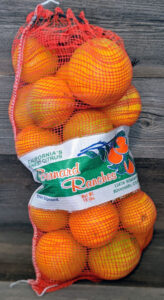Bernard Ranch is in a Fight to Save its Business and its Citrus Trees
- By Pia Hinckle
- Reading Time: 5 mins.
“I had a terrible dream one night,” says Vince Bernard, founder and farmer of Bernard Ranch, who has watched the COVID crisis cut into his sales so much that he may not be able to afford to water all his trees. “I dreamt that I asked my neighbor to bring over his bulldozer and together we knocked down 10 acres of my trees. When I woke up, I felt relieved because now I know what I need to do to keep my trees from suffering.”
COVID-19 is sickening and killing people, but the economic crisis caused by it is also killing businesses, including small farms. In the case of Bernard Ranch, sales have fallen nearly 70% due to the closure of restaurants, slowing of farmers markets, and reductions in orders from businesses such as The FruitGuys. Now COVID may kill some of Vince’s orange trees.
For the Love of Citrus

Vince and his wife Vicki have been farming citrus, including their famously-sweet heirloom Frost Valencia oranges, since 1984 in Riverside, CA. For decades they have been a fixture at farmers markets throughout the region, cultivating loyal weekly clients and becoming a favorite citrus supplier to restaurants and wholesalers.
Vince has 50 acres of citrus trees, including Valencia and Navel oranges, blood oranges, lemons, kumquats, and tangerines. These trees all need to be watered 9 months out of every year for roughly 20 hours a week, at an average cost of about $25,000 a month. Vince normally banks what he sells during peak citrus season in the winter and spring to cover the costs of watering his trees during California’s dry summer and fall months. When COVID closures hit California in March, he saw restaurant orders disappear overnight. He had thousands of pounds of lemons and oranges that he couldn’t sell through his usual channels.
Water is a constant struggle for California farmers, who are blessed by great soil but challenged by a Mediterranean climate that withholds rain for most of the year. “December, January, February, March. After that, the only water the trees get is the water I purchase,” says Vince. This need has been magnified by a recent five-year drought, which increased water needs across the state. “Since March, I’ve had so many sleepless nights pondering whether or not we are going to survive.”
Everyday he says he questions if—or when—he won’t be able to afford enough water. Which trees will have to die?
 Trees like Children
Trees like Children
“I planted those trees. They’re like babies to me,” he says. “They’ll be useless in about 3 weeks with no water. They won’t come back to produce. I can’t watch them die. I just couldn’t bear to see them suffer.”
If it comes to that, Vince said, he will bulldoze the trees to limit their suffering. “It would be like cutting off my arm to save my body. So that dream helped me because I realized what I can do if I have to.”
“FruitGuys uplifted us so much– just reaching out and saying, ‘hey, how can we help?’ What a godsend.”
-Vince Bernard
The farm is not organic certified but still uses all natural growing practices, closely monitoring the water needs of the trees. They do not use any synthetic pesticides, use beneficial insects to control pests, hand weed, and hand-trap gophers. Vince believes in placing flavor above appearance and chooses rootstock that produces the sweetest fruit. The decomposed granite and clay soil is fertilized with urea and seaweed, which Vince says has every element on earth and provides a perfect balance of nutrients to keep trees healthy. As long as they have water in the dry season.
Help Me Sell Oranges

Vince is 68 and is now working 20 hour days to try to save his trees by selling his citrus anywhere he can. When Miguel Esteban Robles, The FruitGuys Los Angeles buyer, reached out to see how he could help, Vince said “Help me sell some oranges!”
The FruitGuys sold 10-pound bags of Vince’s oranges. The number of oranges in each bag ranged from around 18-30, depending on their size, which varies because of the way Vince grows them with his focus on flavor, not uniformity. Buying his oranges is an easy and delicious way to help a small farm threatened by the COVID crisis. (Contact The FruitGuys customer service to see if Vince’s oranges are available in bulk.)
“Commercial growers add 110% of the water the trees need to make the fruit look big and good but that dilutes the taste,” says Vince. “I put on 95% and make it work. They spray everything to kill weeds. I pull weeds myself. I let the trees work. The fruit may be always pretty but it has amazing flavor.”
Summer Oranges
Valencia oranges are summer oranges that are great for juicing and eating out of hand. Sometimes summer oranges have a green tinge to them but it’s not because they’re not ripe. It’s a process called “re-greening” by which the orange sends chlorophyll to the skin of the fruit to prevent sunburn. Green oranges are just as sweet, and sometimes sweeter, than orange oranges.
Read about the differences between Valencia and Navel oranges.
Store oranges at room temperature, or in the refrigerator for up to two weeks.
Staying Alive
Vince hopes The FruitGuys can sell 800 boxes of oranges a week to help him—and his trees—survive. If not, he says he will start by pulling out drip irrigation lines for small sections of trees that already weren’t doing well and taking those trees out.
Vince encourages everyone who wants to help small farms threatened by the COVID crisis to “realize where your fruit comes from.” Many shoppers are used to grocery store fruit that is bred for cold storage, transport, and appearance but lacks flavor and may come from overseas.
“Go to a farmers market and get to know your local farmers,” says Vince. “I never did this to make money. I did this to grow the best fruit there is. It may not be pretty but it tastes great. There’s something rewarding about selling my fruit to a family that I know uses it and enjoys it, week after week, year after year, and then their kids come back as young adults and buy from us. That’s what keeps me going.”
Recent Articles
Fruit Hybrids, Explained: A Love Story from the Orchard
Growth Mindset Lessons for the Office (Thanks, Science!)
Subscribe to our Newsletter
"*" indicates required fields





